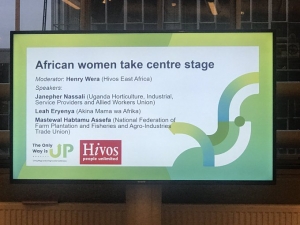The fight for a living wage and income is essential to creating sustainable supply chains and driving better livelihoods. According to studies, women working on flower farms in Uganda who earn a meagre pay of USD28-46 a month are reported to be living below the poverty line. Their plight is not news to anyone in the industry. Akina Mama wa Afrika as part of the Women@Work campaign, an initiative by Hivos where different partners push for decent work conditions for women engaged in global horticulture value chains through promotion of gender inclusive policies and practices participated at the “The Only Way is Up” conference on living wage and living income in Rotterdam, Netherlands. Under the auspices of the campaign, AMwA has contributed to advocacy efforts towards the passage of the minimum wage bill in Uganda.
The conference was a two day solutions oriented space bringing together businesses, government, civil society and trade unions who engaged in dialogue on innovations and best practices, and commitments to jointly step up the efforts for working towards living wages and incomes in global supply chains including bananas, cocoa, flowers and more. Participants made a case for why a living wage is critical and what can be done as a collective to achieve one. Further, beyond just a living wage, workers must be able to earn a living income, for them to afford a decent standard of living not just for themselves, but for all members of their households.

In a breakaway session focusing on what a living wage means for women, especially for those in economies without social protection mechanisms, our Research, Advocacy and Movement Building Manager, Leah Eryenyu together with our alumna of the African Women’s Leadership Institute (AWLI) and General Secretary of the Uganda Horticultural Industrial Services Provider and Allied Workers Union (UHISPAWU), Janepher Nassali, participated in a panel discussion on how women workers can negotiate better wages. The session sought to share best practices to support women at the beginning of the supply chains to negotiate better wages from Uganda. The discussion surfaced the debilitating impact that the lack of a minimum wage has on women working on flower farms.
If an average worker receives €22 a month in Uganda, how much are they paying their domestic workers? We need to consider the ripple effect of low wages and especially the impact on women. They tell women to weave baskets to supplement their income, but when should they do this when they spend all day doing hard physical labor at the flower farm? – Leah Eryenyu
As sustainable sourcing becomes the norm, the next frontier lies in achieving living wage and living income. Over the course of the conference, participants found inspiration in successful initiatives, learned from good practices and identified how to overcome bottlenecks and hurdles. A number of businesses at the convening pledged to undertake ethical business practices nonetheless, as the discussions during the conference had stressed that living wage not only made business sense but is also a moral imperative.